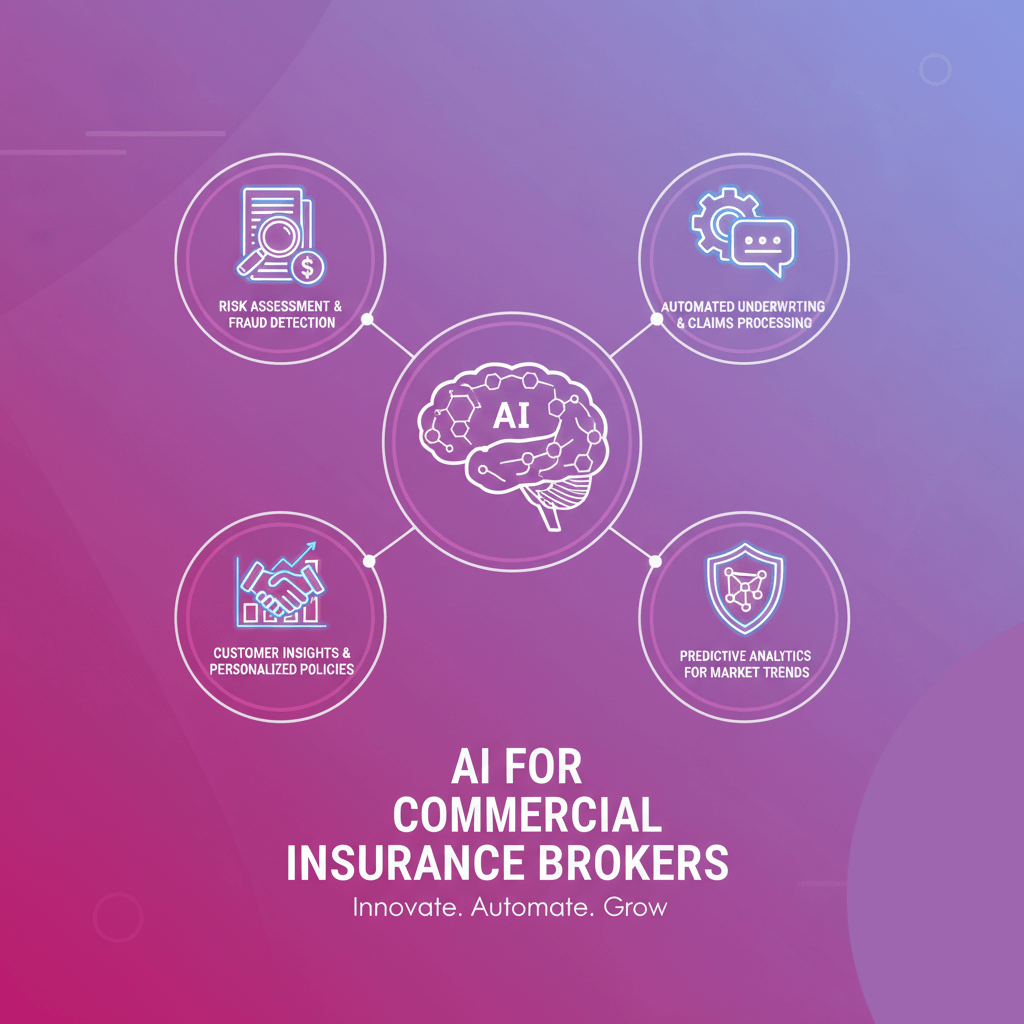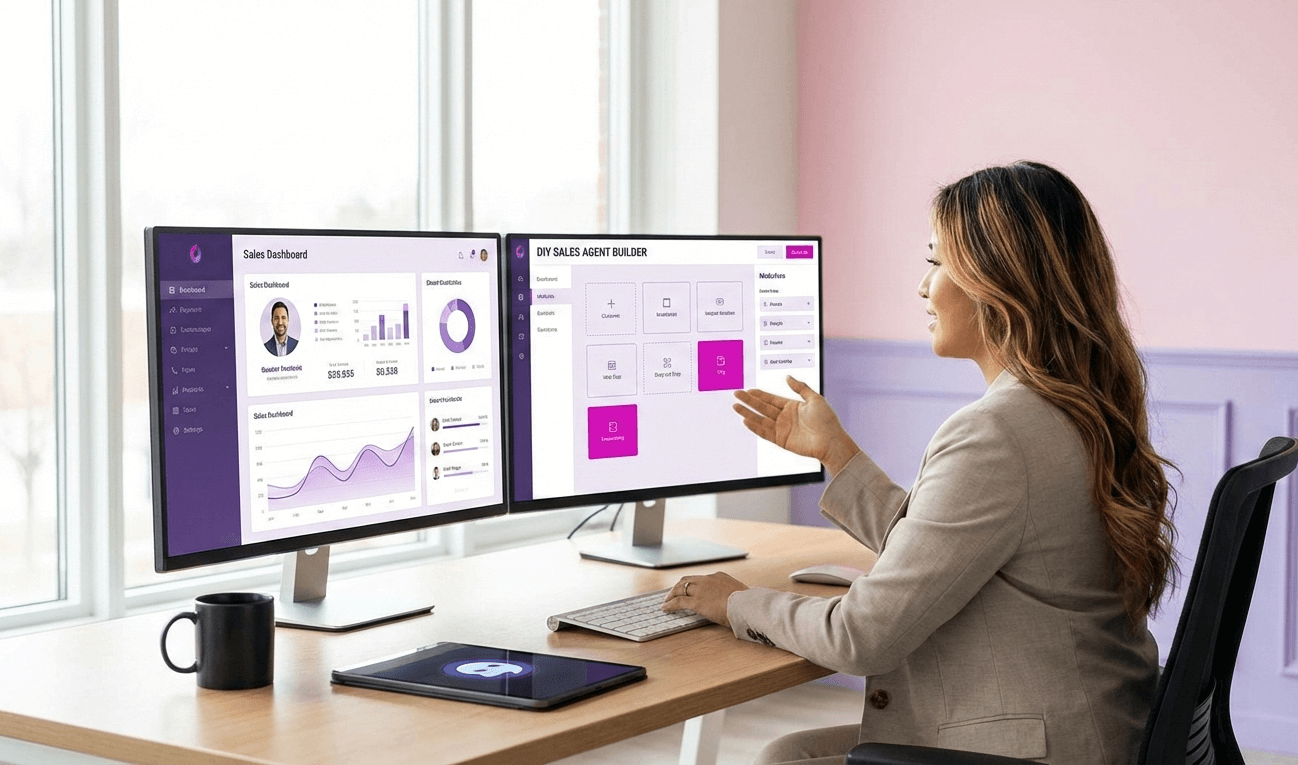“Use an AI for commercial insurance brokers to instantly qualify leads, gather underwriting data, and automatically schedule binder meetings, boosting agency sales efficiency.”
The commercial insurance world moves fast. Brokers often juggle countless tasks. They chase new leads, gather a wealth of data, and strive to secure new business. This process can be slow. It can feel like a constant uphill battle. Time is money, and wasted time on unqualified leads hurts your bottom line.
Think about your typical day. How much time do you spend sifting through prospects? How many calls do you make just to figure out if someone is even a good fit? This initial grind drains resources. It takes away from what you do best: building relationships and closing deals.
This guide will show you a better way. We’ll explore how Artificial Intelligence (AI) can transform your lead qualification process. It will help you streamline operations. It will free up your valuable time. We will specifically focus on how an “AI Insurance Assistant” can revolutionize the process of qualifying leads and scheduling binder meetings.

The Challenge: Time-Consuming Lead Qualification
Every commercial insurance broker knows this pain. A new lead comes in. It could be from an online form. It might be from a referral. The first step is always the same: information gathering. You need to know their industry. You need their revenue. You need their employee count. This isn’t just about collecting data. It’s about understanding their risk profile. It’s about seeing if they even need your services.
This initial phase is critical. But it’s also incredibly inefficient. Your team spends hours on calls. They send endless emails. They just try to get basic details. Many leads turn out to be a poor fit. Others aren’t ready to buy. This wasted effort adds up. It takes a toll on your productivity.
Imagine a world where this preliminary work is done for you. Imagine walking into every first meeting with all the necessary information. This isn’t a pipe dream. AI makes it possible.
The Solution: A Consistent Intake Process Powered by AI
The key to efficiency is consistency. A well-structured intake process ensures you get the correct information every time. This is where AI truly shines.
Structuring Your Intake:
Before AI steps in, define your needs. What information is essential for a preliminary quote?
- Company Name & Industry: This is basic. It immediately gives you context.
- Revenue & Number of Employees: These are crucial for risk assessment. They impact coverage limits.
- Years in Business: Experience often indicates stability.
- Current Insurance Provider & Expiration Dates: This helps you understand their current situation. It also tells you about potential switching opportunities.
- Specific Coverage Needs: Are they looking for General Liability? Workers’ Comp? Property?
- Loss History: This is vital for underwriting.
- Contact Information: Please provide your name, title, phone number, and email address.
Once you have this framework in place, AI can take over.
Introducing the AI Insurance Assistant: Your Virtual Powerhouse
Think of an AI Insurance Assistant as a highly trained, tireless member of your team. This isn’t just a chatbot. This is an advanced system. It can handle complex conversations. It can gather specific data points. It can even schedule appointments.
Let’s talk about SalesCloser.ai. This platform offers an AI solution built specifically for commercial insurance brokers. It automates critical steps in your sales pipeline. It achieves this by leveraging the power of AI.
How SalesCloser.ai Works Its Magic
1. Inbound Lead Qualification:
Leads come from various sources. They might fill out a web form. They could call your office. An AI Insurance Assistant intercepts these inquiries. It engages with the prospect immediately.
- Instant Response: No more waiting. The AI responds within seconds. This increases lead engagement. It reduces bounce rates.
- Guided Conversations: The AI follows your predefined script. It asks all the crucial qualifying questions. It probes for industry specifics. It confirms revenue details. It asks about employee numbers.
- Data Capture: All information is meticulously recorded and documented. It’s stored in your CRM. This creates a rich profile for each prospect.
- Pre-qualify or Disqualify: Based on the answers, the AI determines if the lead meets your criteria. If they don’t, the AI politely informs them. It saves your human brokers from dead ends. If they do qualify, the process moves forward.
2. Outbound Prospecting & Lead Nurturing:
The AI isn’t just reactive. It can also be proactive.
- Targeted Outreach: The AI can make outbound calls. It reaches out to cold or warm leads. It introduces your agency. It gathers initial interest.
- Follow-Up Automation: Leads often need multiple touchpoints. The AI can send automated follow-up emails. It can send text messages. It reminds prospects about upcoming calls. It provides additional information.
- Re-engagement: For older leads, the AI can re-engage them. It checks if their needs have changed. It sees if they are now ready to consider new coverage.
3. Asking the Right Questions, Consistently:
This is where the true value lies. The AI doesn’t forget questions. It doesn’t get tired. It asks for key details every single time.
- Industry: The AI confirms its business sector. It understands their specific risks.
- Revenue: It accurately determines annual revenue. This helps gauge their size. It indicates their insurance needs.
- Number of Employees: This is essential for Workers’ Comp. It also helps with general liability calculations.
- Location(s): Geographic location impacts risk. It also dictates state-specific regulations.
- Years in Business: This provides insight into stability and experience.
- Current Coverage & Expiration: The AI gathers details about their existing policies. This helps identify renewal opportunities.
- Loss History: The AI can delicately inquire about past claims. This is a critical underwriting factor.
4. Seamless Meeting Scheduling:
Once a lead is qualified, the next step is crucial. You need to get them on your calendar.
- Real-time Availability: The AI integrates with your brokers’ calendars to provide accurate and up-to-date information. It knows when they are free. It offers prospects for available slots.
- Automated Invites: Once a time is chosen, the AI sends calendar invites. It includes meeting details. It confirms the appointment.
- Pre-Meeting Preparation: The AI can even send a pre-meeting agenda. It can remind the prospect of what information to have ready. This ensures productive consultations.
5. Streamlining the Entire Sales Process:
The AI acts as a central hub. It connects all phases of your sales cycle.
- From Lead to Binder: The journey from initial inquiry to bound coverage becomes smoother. There are fewer manual handoffs. There is less chance of error.
- Reduced Administrative Burden: Your team spends less time on data entry. They spend less time on scheduling. They focus on complex problem-solving. They focus on closing deals.
- Faster Quoting: With all information upfront, your brokers can generate quotes much faster. This gives you a competitive edge.
The Competitive Advantage: Why AI Matters Now
The commercial insurance market is crowded. Brokers need every advantage they can get. AI provides a significant one.
1. Save Time, Boost Productivity
This is the most apparent benefit. Imagine saving hours each week. Hours are usually spent on initial calls—hours gathering basic info. Your team can redirect this time. They can focus on strategic activities. They can build stronger client relationships. They can develop complex insurance solutions. This leads to higher job satisfaction. It also means better client service.
2. Consistent Data Collection
Humans make mistakes. They sometimes forget a question. An AI doesn’t. It follows the script flawlessly. Every single time. This ensures you have complete and accurate data. It reduces the need for follow-up calls. It prevents costly errors down the line.
3. Faster Sales Cycle
Time to bind coverage is a critical metric. A quicker sales cycle means more satisfied clients. It also means more revenue for your agency. By automating qualification and scheduling, AI drastically reduces this time. You move prospects through your pipeline at an accelerated pace.
4. Improved Lead Quality
The AI acts as a filter. It identifies truly qualified leads. These are prospects who meet your criteria. They are genuinely interested. This means your brokers spend time with people who are more likely to make a purchase. It’s about working smarter, not harder.
5. Better Client Experience
First impressions matter. An immediate, professional AI interaction sets a positive tone. Prospects get their questions answered quickly. They feel valued. The seamless scheduling process adds to this positive experience. This creates trust from the very start.
6. Scalability
As your agency grows, so does your lead volume. Hiring more people to handle initial calls is an expensive option. It’s time-consuming. An AI Insurance Assistant scales effortlessly. It can handle hundreds or thousands of inquiries. It achieves this without compromising quality. It’s a cost-effective way to manage growth.
7. Data-Driven Insights
Every interaction the AI has is recorded. This data is invaluable. You can analyze common questions. You can see which industries are most responsive to your needs. You can identify patterns in successful qualifications. This insight helps you refine your marketing strategies. It also enables you to optimize your sales approach.
Real-World Impact: Transforming Your Agency
Let’s look at some specific scenarios. See how AI can change your daily operations.
Scenario 1: Overwhelmed by Inbound Calls
Your agency runs a successful online ad campaign. The phone starts ringing off the hook. Many callers just want basic information. Some aren’t serious prospects. Your licensed brokers spend valuable time answering these calls. They could be closing deals.
With AI: The AI Insurance Assistant answers every call. It engages prospects. It asks qualifying questions. It collects essential data. Only genuinely qualified leads are passed to your human brokers. The AI schedules its consultation. Your brokers now focus only on high-value conversations.
Scenario 2: Struggling with Workers’ Comp Lead Generation
Workers’ Compensation is a key offering. But finding qualified leads can be tough. You need specific details, such as industry, number of employees, and payroll figures. This information is often challenging to obtain upfront.
With AI: The AI makes targeted outbound calls. It asks these precise questions. It explains the benefits of your workers’ comp solutions. It identifies businesses ready for a quote. It then schedules a meeting. Your team receives pre-qualified Workers’ Comp leads. They are ready for detailed discussions.
Scenario 3: Inconsistent Quoting Process
Different brokers might ask other questions. They might gather different levels of detail. This leads to an inconsistent quoting process. It causes delays. It creates frustration for prospects.
With AI: The AI ensures that every single lead goes through the same intake process. It asks the same set of critical questions. This provides a standardized data set. Your underwriters receive complete information every time. This speeds up the quoting process. It makes it more accurate.
Scenario 4: Improving Client Onboarding
Client onboarding starts long before the policy is bound. It begins with that first interaction. A smooth, professional initial experience sets the stage.
With AI: From the very first touchpoint, the AI manages expectations. It gathers necessary documents. It schedules the initial consultation. This organized approach results in a more seamless onboarding experience. Clients feel confident. They feel supported.
Getting Started with AI: Practical Steps
Implementing AI might seem daunting. But it doesn’t have to be. Here’s a simple roadmap.
Step 1: Define Your Goals. What do you want AI to achieve? Do you want to reduce qualification time? Do you want to increase meeting bookings? Do you want to improve data consistency? Be clear about your objectives.
Step 2: Map Your Current Process. Understand your existing lead qualification flow. Identify bottlenecks. Pinpoint areas where manual effort is high.
Step 3: Choose the Right Partner. Look for an AI solution designed explicitly for the insurance industry. SalesCloser.ai is a good example. Ensure it integrates with your existing CRM and calendar systems. Check for customization options.
Step 4: Train the AI (and Your Team). The AI needs your specific questions and criteria. Provide it with clear scripts. Also, train your human brokers. Show them how to work with the AI-qualified leads. Explain the new workflow.
Step 5: Start Small, Iterate, and Expand. Don’t try to automate everything at once. Start with one specific use case, such as inbound lead qualification. Gather feedback. Make adjustments. Then gradually expand AI’s role.
Step 6: Monitor Performance. Track key metrics. How many leads are being qualified? What’s the conversion rate from AI-scheduled meetings? How much time is saved? Use this data to optimize your AI strategy continually.
Looking Ahead: The Future of Insurance Sales
AI is not a replacement for human brokers. It is an enhancement. It handles repetitive, data-intensive tasks. It frees up your team. They can then focus on their core strengths. They can build relationships. They can apply their expertise. They can offer personalized advice.
The future of commercial insurance sales is likely to be a hybrid model. It combines human intelligence with artificial intelligence. This powerful combination leads to unprecedented efficiency. It leads to superior client experiences. It leads to significant growth for your book of business.
Embrace this technology. It will give you a significant competitive edge. It will transform your agency. It will set you up for long-term success.
FAQs About AI for Commercial Insurance Brokers
Q1: Is AI going to replace my insurance brokers?
A1: No, AI is a tool. It enhances your brokers’ work. It handles repetitive tasks. This frees them up. They can focus on complex sales. They can build client relationships. AI is about augmentation, not replacement.
Q2: How accurate is AI at qualifying leads?
A2: AI is very accurate. It follows predefined scripts. It asks precise questions. It consistently collects data. This leads to a highly reliable qualification. It reduces human error.
Q3: How long does it take to implement an AI assistant?
A3: Implementation time varies. It depends on your specific needs. It depends on system integrations. Many platforms, such as SalesCloser.ai, offer a quick setup. You can start seeing benefits within weeks.
Q4: Can the AI integrate with my existing CRM?
A4: Most advanced AI solutions offer CRM integration. This ensures seamless data flow. It keeps all your client information in one place. Always confirm compatibility before choosing a solution.
Q5: What kind of return on investment (ROI) can I expect?
A5: ROI can be significant. You will see reduced operational costs. You will have increased sales efficiency. You will also experience faster lead conversion. Many agencies report substantial improvements in productivity and revenue.
Q6: Is it difficult for my team to learn how to use AI tools?
A6: Modern AI tools are user-friendly. They have intuitive interfaces. Training for your team is usually straightforward. It focuses on integrating AI-qualified leads into their workflow.
Q7: Can the AI handle different languages?
A7: Many AI platforms offer multi-language support. This allows you to serve a broader range of clients. Check with your chosen provider to determine their specific language capabilities.
Q8: How does AI handle sensitive client information?
A8: Reputable AI providers prioritize data security. They use encryption. They follow strict privacy protocols. Ensure your chosen AI solution complies with industry standards. It should also adhere to data protection regulations.
Q9: Can the AI make outbound calls to cold leads?
A9: Yes, an AI Insurance Assistant can make outbound calls. It can introduce your agency. It can gather initial interest. It can also perform lead nurturing. It can follow up on past prospects.
Q10: What if a lead wants to speak to a human immediately?
A10: The AI is programmed for this. It can seamlessly transfer calls. It directs the prospect to a human broker. This happens if the lead requests it. It also occurs if the AI determines a need for immediate human intervention.
Q11: How does AI help with Workers’ Comp lead generation specifically?
A11: AI excels here. It asks targeted questions. It gathers crucial data points. These include industry, employee count, and payroll. This pre-qualifies Workers’ Comp leads. It delivers them ready for a quote.
Q12: Does AI help with growing my book of business?
A12: Absolutely. By streamlining lead qualification, AI opens up capacity. Your brokers can focus on more sales. This accelerates client acquisition. It directly contributes to growing your book of business.
Q13: Can AI help with client onboarding beyond just scheduling?
A13: Yes. After scheduling, the AI can send reminders. It can share introductory materials. It can even prompt clients for initial documents. This creates a smoother, more organized onboarding experience.
Q14: How does AI streamline the quoting process?
A14: AI ensures complete data collection upfront. Brokers receive all necessary underwriting info. This speeds up quote generation. It reduces back-and-forth communication.
Q15: What kind of data can the AI collect from prospects?
A15: The AI can collect a wide range of data. This includes the company name, industry, revenue, employee count, and location. It can also gather current insurer, expiration dates, and loss history. You define the specific data points needed.
Q16: Is an “AI Insurance Assistant” different from a chatbot?
A16: Yes, significantly. A chatbot handles basic Q&A. An AI Insurance Assistant is more advanced. It conducts complex, multi-turn conversations. It qualifies leads. It gathers detailed information. It schedules appointments autonomously.
Q17: Will AI make my agency seem less personal?
A17: Not at all. By automating initial qualification, AI frees up your human brokers to focus on more complex tasks. They can then dedicate more time to personalized service. They can focus on complex needs. This actually enhances the personal touch when it matters most.
Q18: What are the “commercial lines automation” benefits specifically?
A18: Commercial lines automation, through AI, provides speed. It offers efficiency. It also gives consistency. It reduces manual tasks. It improves data quality. It ultimately drives more new business.
Q19: How does AI help “book more client meetings”?
A19: AI qualifies leads efficiently. It identifies prospects ready to meet. It then integrates with calendars. It schedules meetings automatically. This directly leads to more booked consultations for your team.
Q20: Can AI improve how we handle referrals?
A20: Yes. AI can quickly engage referral leads. It gathers their information. It pre-qualifies them. This ensures referred prospects receive immediate, professional attention. It maximizes the value of every referral.








